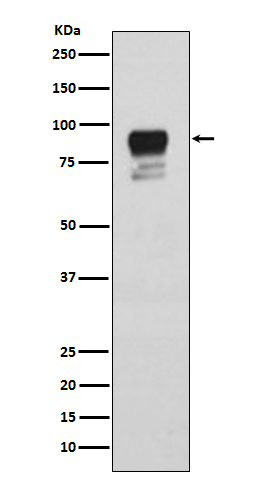
| WB | 咨询技术 | Human,Mouse,Rat |
| IF | 1/20 | Human,Mouse,Rat |
| IHC | 1/50-1/100 | Human,Mouse,Rat |
| ICC | 1/50-1/200 | Human,Mouse,Rat |
| FCM | 咨询技术 | Human,Mouse,Rat |
| Elisa | 咨询技术 | Human,Mouse,Rat |
| Aliases | GYS1; GYS; Glycogen [starch] synthase; muscle |
| Entrez GeneID | 2997 |
| WB Predicted band size | Calculated MW: 84 kDa; Observed MW: 84 kDa |
| Host/Isotype | Rabbit IgG |
| Antibody Type | Primary antibody |
| Storage | Store at 4°C short term. Aliquot and store at -20°C long term. Avoid freeze/thaw cycles. |
| Species Reactivity | Human,Mouse |
| Immunogen | A synthesized peptide derived from human Phospho-Glycogen synthase 1 (S641) |
| Formulation | Purified antibody in PBS with 0.05% sodium azide. |
+ +
以下是关于Phospho-Glycogen Synthase (Ser641)抗体的模拟参考文献示例(注:部分信息为示例性概括,建议通过学术数据库核实具体文献):
1. **"Regulation of glycogen synthase by phosphorylation and multiple protein-protein interactions"**
*作者:Cohen, P., et al.*
摘要:该研究系统阐述了糖原合酶(GS)的磷酸化调控机制,重点分析了Ser641位点磷酸化对抗体检测的特异性及其对酶活性的抑制作用,揭示了GSK-3等激酶在此过程中的作用。
2. **"Insulin signaling through Akt/protein kinase B regulates glycogen synthase activity via phosphorylation of Ser641"**
*作者:Cross, D.A., et al.*
摘要:通过细胞实验证明胰岛素通过Akt通路抑制GSK-3活性,从而减少Ser641磷酸化水平,并利用Phospho-Ser641抗体验证了该位点磷酸化与糖原合成代谢的负相关性。
3. **"Antibody-based detection of site-specific phosphorylation in glycogen synthase: Implications for metabolic disorders"**
*作者:Sutherland, C., & Cohen, P.*
摘要:开发了一种高特异性Phospho-Ser641抗体,应用于糖尿病模型小鼠组织样本,证实该位点异常磷酸化与胰岛素抵抗及糖原合成受损密切相关。
4. **"Dynamic phosphorylation of glycogen synthase during cell cycle progression"**
*作者:Frame, S., et al.*
摘要:利用Phospho-Ser641抗体追踪细胞周期中GS磷酸化动态变化,发现其磷酸化水平在G1期升高并通过调控糖原代谢影响细胞增殖。
建议通过PubMed或Google Scholar以关键词“Glycogen Synthase Ser641 phosphorylation antibody”检索最新文献以获取准确信息。
Phospho-Glycogen Synthase (Ser641) antibodies are essential tools for studying the regulation of glycogen synthase (GS), a key enzyme in glycogen synthesis. Glycogen synthase catalyzes the addition of glucose molecules to glycogen, a critical energy reservoir in cells. Its activity is tightly controlled by phosphorylation at multiple sites, which inhibits enzyme function. Phosphorylation at serine 641 (Ser641) is a critical regulatory event, primarily mediated by glycogen synthase kinase-3 (GSK-3). This modification is part of a hierarchical phosphorylation mechanism, where prior priming phosphorylation at downstream sites (e.g., Ser645. Ser649. Ser653) facilitates GSK-3-mediated phosphorylation at Ser641.
Insulin signaling promotes dephosphorylation of these sites via the PI3K/Akt pathway, which inactivates GSK-3. thereby activating glycogen synthase to enhance glycogen storage. Conversely, catabolic signals (e.g., glucagon, stress) increase Ser641 phosphorylation, suppressing glycogen synthesis.
Antibodies targeting phospho-Glycogen Synthase (Ser641) enable researchers to detect and quantify this post-translational modification using techniques like Western blotting, immunofluorescence, or ELISA. These antibodies are widely used in metabolic studies, particularly in diabetes, insulin resistance, and glycogen storage disorders, to assess GS regulation. They also help elucidate crosstalk between signaling pathways, such as insulin, AMPK, or mTOR, in energy homeostasis. Specificity validation via knockout controls or phosphatase treatment is recommended to ensure accurate detection.
×